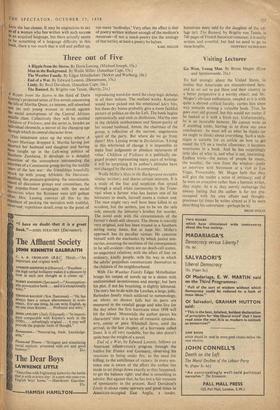Three out of Five
A Ripple from the Storm. By Doris Lessing. (Michael Joseph, 15s.) Man in the Background. By Wolfe Miller. (Jonathan Cape, 15s.) The Weather Family. By Edgar Mittellaolzer. (Secker and Warburg, 18s.) End of a War. By Edward Loomis. (Heinemann, 15s.) Lindy. By Basil Davidson. (Jonathan Cape, 16s.) The Bastard. By Brigitte von Tessin. (Barrie, 21s.)
A Ripple from the Storni is the third of Doris Lessing's projected series of five novels concerning the life of Martha Quest, an intense, self-absorbed and (as yet) young woman in revolt against the social assumptions of the Central African middle class. Collectively they will be entitled Children of Violence, and the series is, besides an Individual chronicle, a mirror of the changing age through which its central character lives.
This instalment takes up the story where A Proper Marriage dropped it, Martha having just deserted her husband and daughter and having been caught up in the Left-wing politics of Southern Zambesia. It develops as a detailed evocation of the atmosphere surrounding the activities of a Communist group during the middle Years of the last war : the friendships hopefully struck up with young Africans, the literature- Peddling, the pressure-grouping, the interminable round of discussion groups and committees, the last Popular-front campaigns with the social democrats when the Russians were still gallant allies. Mrs. Lessing conveys all this by the expedient of packing the narrative with truthful, observant, repetitious detail, even to the point of reproducing word-for-word the chop-logic debates in all their tedium. The method works. Koestler would have picked out the emotional juicy bits, but these dry bones probably give a more faithful picture of politics on the far Left. The book begins optimistically and ends in disillusion. Martha sees in the childish stubbornness and Simon-purity of her second husband, Anton, the chairman of the group, a reflection of the narrow, ungenerous spirit of the party. But where do we go from there? Mrs. Lessing wrote in Declaration, 'Living in this whirlwind of change it is impossible to make final judgments or absolute statements of value.' Children of Violence is a politically en- gaged project representing many years of writing; it will be surprising if its author's attitudes have not changed by the time it is completed.
Wolfe Miller's Man in the Background occupies similar territory and shares certain interests. It is a study of the fear and suspicion that spread through a small white community in the Trans- vaal when a farmer who has beaten one of his labourers to death, himself meets a violent end. The man might very well have been killed in an accident, but the settlers, just to be on the safe side, execute the labourer's brother for murder. The novel ends with the circumstances of the farmer's death still obscure. The theme is scarcely very original, and has been treated in a Southern setting many times, but at least Mr. Miller's approach has its peculiar virtues. He concerns himself with the mechanics by which justice mis- carries, assuming the nastiness of the consequences to be self-evident—there are no death-cell scenes, no anguished relatives; with the effect of fear on ordinary, kindly people; with the way in which the adults' prejudices communicate themselves to the children of the neighbourhood.
With The Weather Family Edgar Mittelholzer brings his output of novels up to a dozen with undiminished inventiveness and energy; but here his plot, if not his breathing, is slightly laboured. The story has to do with the Larches, a large, jolly, Barbadan family much addicted to meteorology, on whom no shower falls but its parts are measured in the rainfall gauge and who live for the day when the first hurricane since 1898 will hit the island. Meanwhile the author passes his characters' time in a series of romantic episodes, wry, comic or pure Whitehall farce, until the arrival, in the last chapter, of a hurricane called Janet. It is all very readable, but the idea doesn't quite bear the weight of a novel.
End of a War, by Edward Loomis, follows an American infantryman's progress through the battles for France and Germany, observing his reactions to being under fire, to the need for killing, to the anticlimax of victory. In every sen- tence one is aware of the effort the author has made to set things down exactly as they happened, to get the balance right; and that is something to admire. But against that, he has lost a fair measure of spontaneity in the process. Basil Davidson's Lindy is about rustic spivvery and good times in American-occupied East Anglia, a tender,
humorous story told by the daughter of the vil- lage tart. The Bastard, by Brigitte von Tessin, is 740 pages of French historical romance; it is easily written and eventful, but had no need to go to


































 Previous page
Previous page